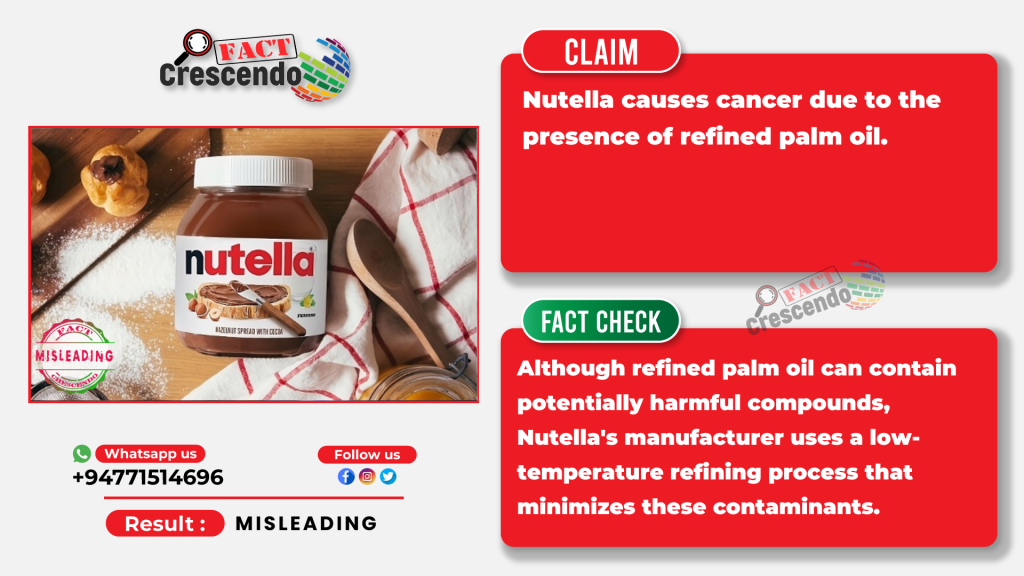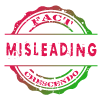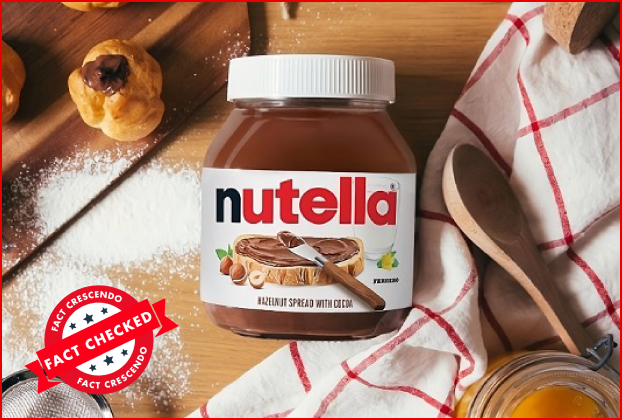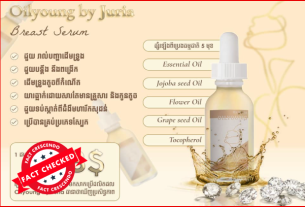
Recently, people have become worried about the claim that Nutella, the popular chocolate-hazelnut spread, might cause cancer. This concern comes from the fact that Nutella contains refined palm oil. When palm oil is processed at high temperatures, it can create compounds that might cause cancer. Health authorities, like the European Food Safety Authority (EFSA), have reported the risks of these compounds. This has led to public debate and questions about the safety of eating products with refined palm oil.
Social Media Claims
We recently discovered a claim circulating on social media platforms, including Facebook and Instagram, alleging that Nutella, the popular hazelnut spread, has the potential to cause cancer.
We decided to conduct an investigation to gather more information and gain a deeper understanding of the matter.
Fact Check
Refined palm oil in Nutella
It is true that Nutella, a popular chocolate hazelnut spread, contains refined palm oil. In May 2016, the European Food Safety Authority (EFSA) released a report about possible cancer-causing compounds in palm oil. The report pointed out three compounds: Glycidol Ester (GE), 3-MCPD, and 2-MCPD. These compounds can form when vegetable oils are refined at high temperatures, raising concerns about their presence in food products like Nutella.
European Food Safety Authority Report on Potentially Carcinogenic Compounds in Palm Oil
In May 2016, the European Food Safety Authority (EFSA) reported that refining palm oil at temperatures above 200°C creates more potentially cancer-causing contaminants than other vegetable oils. Despite this, EFSA did not tell people to stop eating palm oil, saying more research is needed. The European Commission conducted a detailed study on a harmful contaminant called Glycidol Ester (GE) in 2014. EFSA had already identified GE as harmful in an earlier study.
However, EFSA further clarified that it can only give recommendations, not enforce rules. The European Commission is reviewing the issue and may introduce regulations to limit GE levels in food, but there won’t be a ban on palm oil.
The World Health Organization and the U.N. Food and Agriculture Organization have also noted the risks of GE but have not advised people to avoid palm oil. The U.S. Food and Drug Administration also has not banned palm oil in food.
GE (Glycidol Ester), 3-MCPD, and 2-MCPD
GE (Glycidol Ester): This compound gets the most attention. It’s found in higher amounts in palm oil compared to other oils. GE is a “genotoxin,” meaning it can damage DNA—a step in cancer cell formation.
3-MCPD and 2-MCPD: These compounds can also be produced alongside GE and can be harmful on their own. 3-MCPD affects kidneys and male reproductive organs in animal studies.
GE Risk to Babies and Children
The EFSA report highlighted that babies, particularly those fed formula, are at the greatest risk of consuming higher levels of GE. Charts in the report indicated that the intake of GE is significantly higher in babies and young children compared to adults.
See the full report HERE.
This finding underscores the importance of monitoring and regulating the presence of such compounds in food products intended for infants. Breastmilk remains the preferred feeding option for babies, providing a safer alternative to formula.
GE (Glycidol Ester) and Cancer Risk
Among the compounds studied, GE received the most attention due to its potential health risks. GE is known to be a genotoxin, meaning it can cause damage to DNA, which is a crucial step in the formation of cancer cells.
Animal studies have shown that exposure to GE can lead to harmful effects, including the development of tumours. However, it is important to note that these studies were conducted on animals, and their relevance to human health is still under investigation.
Other Harmful Compounds
In addition to GE, the EFSA report also addressed 3-MCPD and its potential health impacts. In animal studies, 3-MCPD has been found to have adverse effects on the kidneys and male reproductive organs. The data on 2-MCPD, however, was limited, making it difficult to draw definitive conclusions about its health risks.
Nutella’s Response
Fact Crescendo Team contacted Nutella for clarification on this matter. A Ferrero spokesperson confirmed their safety standards and emphasized that their palm oil usage fully aligns with EFSA standards.
“Nutella is completely safe to eat, and Ferrero is committed to the highest food safety and quality standards.
At Ferrero we have always paid great attention to both the quality of our products and the raw materials we use. The palm oil in Nutella is absolutely safe as per relevant legislation, and the Ferrero’s standards are very strict when it comes to its harvesting practices, processing and production techniques.
In 2016, the European Food Safety Authority (EFSA) completed a study that links high-temperature palm oil refining to the potential product of a carcinogenic contaminant (‘GE’). A few years later, EFSA updated its risk assessment (https://www.efsa.europa.eu/en/efsajournal/pub/5083*), affirming that some thermal contaminants (2MCPD, 3MCPD, GE) are present in a wide range of foods, and found in larger quantities in vegetable oils subjected to high temperatures during food processing.*
Ferrero has always highlighted it uses a palm oil with low-temperature refining process, which takes significantly longer and is more expensive than high-temperature refining but best ensures the highest possible quality for all Ferrero products, with minimal levels of contaminants that are fully aligned with EFSA standards.
None of Ferrero’s products using palm oil, including Nutella, have been removed from the shelves in any country around the world. The company also works very closely with the EFSA to ensure all its products are fully compliant with the EFSA’s guidelines.
We believe that palm oil is the best option to ensure our Nutella spread has the right consistency and structure, and does not interfere with the characteristic flavours of the other ingredients.”
Key Takeaways:
- Who’s at Risk: Infants are the most susceptible since some depend entirely on infant formulas, which can be high in GE. Breast milk is still the best option, but formulas are sometimes necessary.
- Adults vs. Babies: Adults eat a variety of foods, while babies have a more limited diet. Babies who drink formulas have over twice the average GE intake.
- Nutella’s Defense: Ferrero ensures the safety and quality of its products, including Nutella, by using a low-temperature refining process for palm oil, which minimizes contaminants and complies with EFSA standards.
Conclusion
The debate around the safety of palm oil, particularly in products like Nutella, highlights the complexities of food safety and regulatory standards. While the European Food Safety Authority (EFSA) and other organisations have identified potential risks associated with compounds like Glycidol Ester (GE), 3-MCPD, and 2-MCPD formed during high-temperature refining of palm oil, more research is needed to understand the implications for human health fully.
A Ferrero spokesperson confirmed that Nutella is safe to eat, emphasizing that their palm oil usage aligns with EFSA standards. They stated that Ferrero uses a low-temperature refining process for palm oil, which minimizes contaminants. The spokesperson highlighted Ferrero’s commitment to high food safety and quality standards and noted that none of their products have been removed from shelves anywhere in the world.

Title:Does Nutella have the potential to cause cancer?
Fact Check By: Fact Crescendo TeamResult: Misleading






